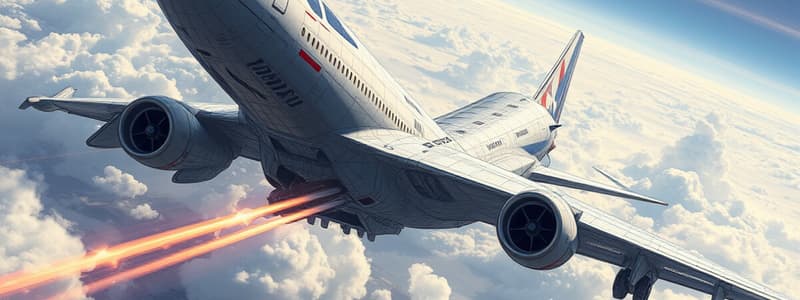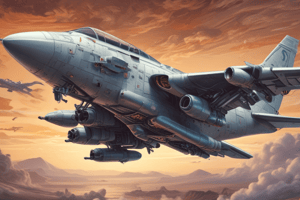Podcast
Questions and Answers
What is the primary load-carrying component in a monocoque fuselage design?
What is the primary load-carrying component in a monocoque fuselage design?
- Stringers
- Bulkheads
- Skin (correct)
- Longerons
Which component is primarily responsible for taking bending loads in a fuselage?
Which component is primarily responsible for taking bending loads in a fuselage?
- Stringers
- Skin
- Longerons (correct)
- Formers
How do stringers contribute to the fuselage structure?
How do stringers contribute to the fuselage structure?
- They carry all vertical loads.
- They act as the main framework of the fuselage.
- They provide primary load-bearing support.
- They maintain the shape and support skin attachment. (correct)
Which of the following is NOT a major member found in metal aircraft construction?
Which of the following is NOT a major member found in metal aircraft construction?
Which two classes are used to categorize fuselage type?
Which two classes are used to categorize fuselage type?
What distinguishes the role of longerons from that of stringers in a fuselage?
What distinguishes the role of longerons from that of stringers in a fuselage?
In the context of fuselage construction, what is typically the function of bulkheads?
In the context of fuselage construction, what is typically the function of bulkheads?
Which of the following statements about fuselage members is true?
Which of the following statements about fuselage members is true?
Which type of aircraft primarily experiences the most structural stresses during flight?
Which type of aircraft primarily experiences the most structural stresses during flight?
What are the major categories of aircraft mentioned in the overview?
What are the major categories of aircraft mentioned in the overview?
What is one of the objectives for students in this module?
What is one of the objectives for students in this module?
Which category of aircraft is the main focus of this module?
Which category of aircraft is the main focus of this module?
What is one of the responsibilities outlined for engineers in this module?
What is one of the responsibilities outlined for engineers in this module?
How is the structural weight of an aircraft primarily derived?
How is the structural weight of an aircraft primarily derived?
What is vital to remember when discussing the design process for aircraft?
What is vital to remember when discussing the design process for aircraft?
What type of aircraft are airplanes classified as?
What type of aircraft are airplanes classified as?
What defines a power-driven heavier-than-air aircraft?
What defines a power-driven heavier-than-air aircraft?
Which of the following describes a glider?
Which of the following describes a glider?
Which component is classified as a primary structural member in aircraft?
Which component is classified as a primary structural member in aircraft?
What is a truss in the context of fuselage structure?
What is a truss in the context of fuselage structure?
Which form of construction is NOT typically considered a primary structural member?
Which form of construction is NOT typically considered a primary structural member?
What is the role of secondary structural members in an aircraft?
What is the role of secondary structural members in an aircraft?
Which type of aircraft is categorized as lighter-than-air?
Which type of aircraft is categorized as lighter-than-air?
Failure of which structural component may lead to catastrophic consequences in an aircraft?
Failure of which structural component may lead to catastrophic consequences in an aircraft?
What materials are commonly used for stringers in aircraft construction?
What materials are commonly used for stringers in aircraft construction?
What role does the metal skin of the fuselage play in aircraft structure?
What role does the metal skin of the fuselage play in aircraft structure?
Which of the following is NOT a major member found in the wing group of a metal aircraft?
Which of the following is NOT a major member found in the wing group of a metal aircraft?
What are the common construction methods for wing spars in metal aircraft?
What are the common construction methods for wing spars in metal aircraft?
Which of the following rib constructions is characterized by the presence of lightening holes?
Which of the following rib constructions is characterized by the presence of lightening holes?
What is the primary purpose of the honeycomb structure in aircraft wings?
What is the primary purpose of the honeycomb structure in aircraft wings?
What components are part of the empennage group in aircraft construction?
What components are part of the empennage group in aircraft construction?
What is a characteristic feature of the powerplant group in aircraft structure?
What is a characteristic feature of the powerplant group in aircraft structure?
Which factor primarily affects the thickness of the fuselage skin?
Which factor primarily affects the thickness of the fuselage skin?
What type of landing gear is characterized by wheels that retract into the aircraft body?
What type of landing gear is characterized by wheels that retract into the aircraft body?
In the context of wing construction, what does the term 'sandwich structure' refer to?
In the context of wing construction, what does the term 'sandwich structure' refer to?
What is the purpose of using control surfaces in the empennage group?
What is the purpose of using control surfaces in the empennage group?
Which type of rib construction is solid and lacks holes?
Which type of rib construction is solid and lacks holes?
Flashcards are hidden until you start studying
Study Notes
Module Overview
- Focus on aircraft structural design and manufacturing processes.
- Topics include major/minor structural members, design processes, structural weight, engineers' responsibilities, and production.
Learning Objectives
- Identify and explain functions of various structural members.
- Narrate general aircraft design processes.
- Explain derivation of structural weights.
- Discuss responsibilities of engineers in the field.
- Narrate aircraft structure production processes.
Categories of Aircraft
- Airplane: Heavier-than-air aircraft obtaining lift from fixed aerodynamic surfaces.
- Rotorcraft: Heavier-than-air aircraft supported by one or more rotors.
- Glider: Non-powered heavier-than-air craft achieving lift from fixed aerodynamic surfaces.
- Lighter-than-air Aircraft: Includes hot air balloons, airships, and blimps.
Structural Members
- Primary/Major Members: Essential for sustaining ultimate flight and ground loads. Includes wings, fuselage, tail, landing gear. Critical failure leads to loss of control.
- Secondary/Minor Members: Support only air or inertial loads, do not involve primary structural integrity.
Fuselage Structure
- Truss Type: Rigid framework made of beams and struts, usually covered with fabric.
- Monocoque: Relies on skin's strength for load carry, can be pure monocoque or semimonocoque.
Major Metal Fuselage Components
- Formers: Cross-section frames supporting the structure.
- Longerons: Primary bending load carriers, extend across fuselage.
- Stringers: Lighter members reinforcing shape, used for skin attachment.
- Bulkheads: Vertical or horizontal partition in the fuselage.
- Skin: Metal covering riveted to the structure, load-carrying capability varies by thickness.
Wing Structure
- Major Members: Comprise spars, ribs, stringers, and skin.
- Spar Construction: Can utilize truss type, wet wing design, or various beam extrusions.
- Rib Construction: Composed of truss type, lightened metal, solid ribs, or composite materials.
Wing Internal Features
- Skin Attachment: Wing skin affixed to ribs using stringers.
- Honeycomb Structures: Employed for additional rigidity in wings.
- Sandwich Structures: Increases stiffness in aircraft components.
Empennage Group
- Consists of major members like spars, ribs, stringers, skin, and control surfaces, essential for stability and control.
Powerplant Group
- Components include cowling, nacelle, pylons, and struts, critical for engine support and aerodynamics.
Landing Gear Group
- Composed of struts, wheel well and doors, and wheel hub, designed for safe takeoff and landing operations.
Types of Landing Gear
- Varieties include fixed, retractable, skid (for helicopters), float (amphibious), ski (for snow), and basket base configurations.
Summary
- The module covers fundamental concepts in aircraft structure, detailing types, members, and their respective roles, essential for engineering students in aeronautics.
Studying That Suits You
Use AI to generate personalized quizzes and flashcards to suit your learning preferences.




